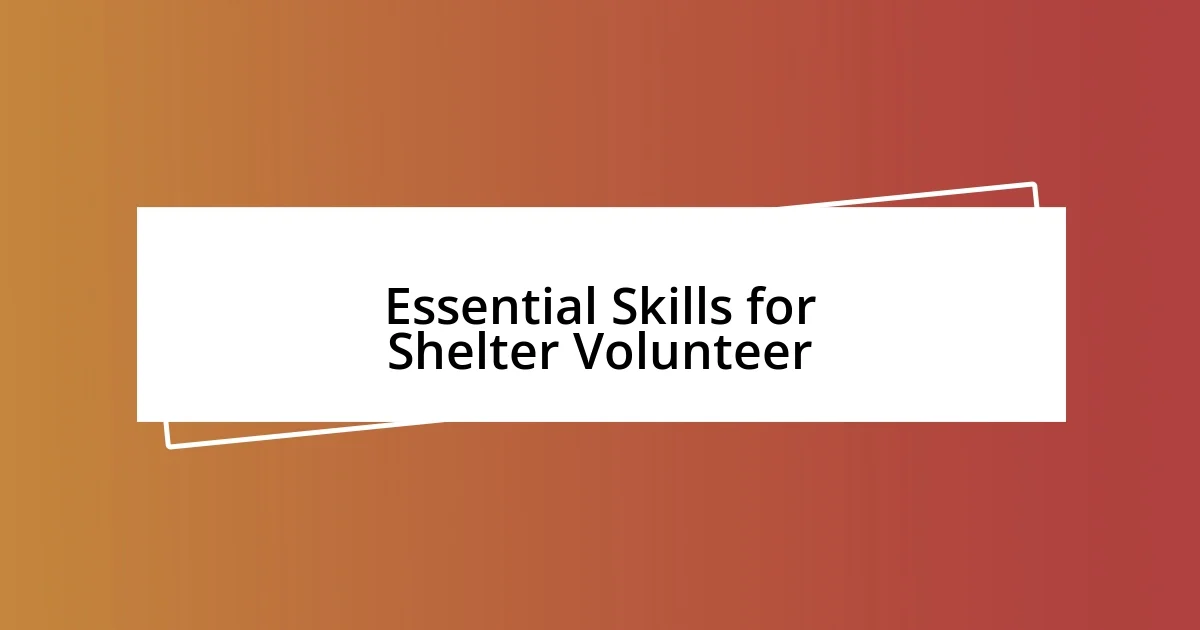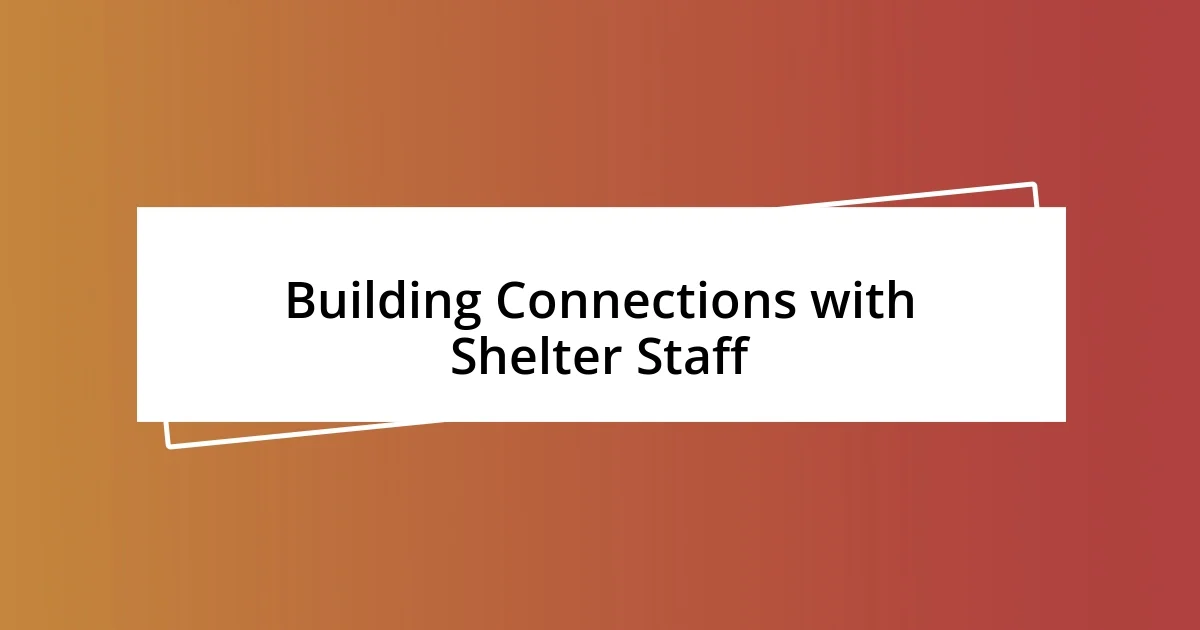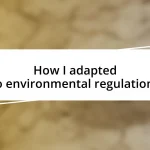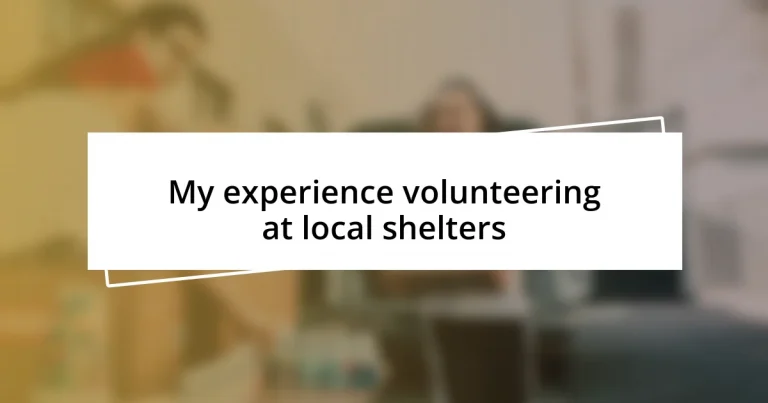Key takeaways:
- Volunteering at shelters fosters deep connections and personal growth, revealing shared humanity and resilience through individual stories.
- Different types of shelters (homeless, animal, domestic violence) offer unique experiences that impact both the volunteer’s contribution and personal development.
- Building relationships with shelter staff enhances teamwork, empathy, and the overall atmosphere, highlighting the importance of kindness and understanding in service work.

Reasons to Volunteer at Shelters
Volunteering at local shelters gives you a unique chance to connect with individuals from diverse backgrounds. I remember one evening, while serving meals at a homeless shelter, a young woman shared her story about losing her job and her home. It made me realize that behind every face, there’s a story filled with challenges, dreams, and resilience. Isn’t it incredible to be a part of spaces where such powerful narratives unfold?
Moreover, volunteering can teach you invaluable life lessons. It’s easy to take our comforts for granted until you witness someone’s struggle firsthand. I often found myself reflecting on my own privilege after spending time with shelter residents. This experience has a way of grounding you in gratitude, challenging you to reassess what truly matters in life. Have you ever felt that shift in perspective from a single moment of connection?
Lastly, your efforts can have a tangible impact on the community. Just last summer, I helped organize a donation drive that collected hundreds of essential items for a local shelter. Seeing the joy and relief on the faces of both the volunteers and the recipients was a vivid reminder that even small acts of kindness can spark hope and change. How powerful is it to know that your time can transform lives, even in just one small way?

Types of Shelters to Consider
Different types of shelters provide distinct services and support to those in need, which can significantly influence your volunteer experience. For instance, homeless shelters typically offer temporary refuge and basic resources such as food and clothing. I remember one time at a shelter that focused on families; the atmosphere was filled with a mixture of hope and desperation, as parents sought stability for their children. This taught me how vital it is to address not just immediate needs but also the emotional well-being of families facing tough times.
On the other hand, animal shelters strive to find homes for abandoned animals, emphasizing a different yet equally rewarding kind of service. When I volunteered at an animal shelter, I was struck by the joy of seeing a once-neglected dog find a loving home. It showed me how important it is to advocate for the voiceless, adding another layer to the volunteer experience. Have you ever thought about how volunteering for a cause that resonates with your passions can enhance your connection to the work?
There are also specialized shelters, like those for victims of domestic violence, which provide a safe environment and critical support services. During my time volunteering in such a shelter, I witnessed profound transformations as women regained their strength and confidence, often overcoming years of hardship. It reaffirmed my belief that the type of shelter you choose can shape not only your impact but also your personal growth. In what ways have you considered that the right fit could amplify your experience?
| Type of Shelter | Primary Focus |
|---|---|
| Homeless Shelters | Provide temporary accommodation and basic needs. |
| Animal Shelters | Rescue abandoned animals and find them forever homes. |
| Domestic Violence Shelters | Offer safe haven and resources for victims. |

Preparing for Your Volunteering Experience
Getting ready for your volunteering experience can feel daunting at first, but I promise it’s an exciting journey worth every moment. When I first started, I quickly learned that preparation goes beyond just showing up. It involves understanding the needs of the shelter and what role you can best fill. I remember doing some research beforehand, which helped me ask the right questions when I arrived. It was comforting to know I was stepping into a space where I could genuinely contribute.
Here’s a list of things to consider when preparing for your volunteering experience:
- Research the Shelter: Understand its mission and the specific challenges it addresses. This insight can guide how you can make the most impact.
- Understand Your Role: Clarify what tasks are expected of you to ensure that you’re ready to jump in confidently from day one.
- Pack Essentials: Bring necessary items like comfortable clothing, water, and snacks to keep your energy up throughout your shift.
- Stay Open-Minded: Each day will bring its unique stories and experiences, so being mentally prepared for the unexpected can enrich your time there.
- Reflect on Your Intentions: Spend some time thinking about why you want to volunteer. This personal alignment can deepen your commitment and connection to the work.
The emotional preparation also matters. I found it incredibly helpful to mentally prepare for the various stories I would encounter. One day, I came across a man who had lost everything in a fire. Hearing him express gratitude for just a warm meal made me realize how crucial it is to approach each experience with empathy. Whatever your reasons for volunteering, being emotionally equipped can enhance your interactions and help you make meaningful connections with those you serve.

Essential Skills for Shelter Volunteer
When volunteering at a shelter, effective communication is crucial. I remember a time when I worked alongside staff and other volunteers, and we had to coordinate our tasks efficiently. Some individuals at the shelter might come from challenging backgrounds, and being able to listen and empathize can help bridge the gap between them and the volunteers. Have you ever considered how a simple conversation can change someone’s day? I certainly felt that impact during my short interactions, where listening meant so much.
Teamwork is another essential skill that I found invaluable. In one instance, we were organizing a food drive, and it was heartwarming to see everyone come together, each contributing their strengths. Just like a well-oiled machine, when volunteers and staff collaborate, both the shelter and those it serves benefit immensely. I often reflect on the idea that, collectively, we can amplify our impact—something that might not be as effective if we worked in silos.
Adaptability is also key when volunteering. I recall a day when a sudden influx of families arrived at the shelter, and we had to adjust our plans quickly. Being flexible allowed me to jump from sorting donations to helping serve meals seamlessly. It taught me that plans can shift, and being ready to pivot can make a huge difference in how we support those in need. Have you thought about how being adaptable could enhance your volunteering experience? Embracing that mindset has certainly transformed mine, making every shift feel fresh and meaningful.

Day-to-Day Activities in Shelters
Each day in the shelter is filled with a variety of activities that keep everyone engaged and focused on our mission. I often began my shifts with meal preparation, chopping vegetables alongside other volunteers. It was a simple task, but the laughter and conversations shared over chopping onions created a warm environment that made the hard work feel lighter. In those moments, I realized that we weren’t just feeding people; we were nurturing a community.
After meals, my role often shifted to organizing donations. There’s something incredibly satisfying about sorting through bags of clothes and food, knowing each item will play a part in someone’s journey. I remember one Saturday when I found a beautiful, hand-knitted sweater buried in a box. I held it up, and instantly I could picture someone wearing it on a chilly night, feeling comforted. It made me appreciate how even the smallest items can have profound effects on individuals facing tough times.
As the day progressed, it was common to be called to assist with client referrals or workshops aimed at helping guests find employment. I vividly recall a workshop I helped run where we discussed interview techniques. One participant opened up about their fear of rejection, a sentiment I could relate to. Sharing my own experience made it easier for them to express their concerns. It struck me how these interactions go beyond just tasks—they’re about building trust, fostering hope, and empowering individuals to take steps toward a brighter future. Have you ever thought about how these small conversations can plant seeds of change in someone’s life? I truly believe they can.

Building Connections with Shelter Staff
Building connections with the staff at the shelter was one of the most enriching aspects of my experience. I remember chatting with a staff member during a quiet moment, sharing coffee and exchanging stories about our journeys. Those candid conversations not only broke the ice but also created a level of trust that made teamwork feel effortless. How often do we take the time to connect on a personal level? In my case, it turned what could have been a daunting environment into one filled with camaraderie.
Working alongside the staff, I quickly learned that they possess an incredible wealth of knowledge and experience. I once turned to the shelter manager for advice on handling a tense situation with a guest. Their calm, insightful approach not only guided me but also deepened my respect for the dedication and care they bring to their roles. Have you ever found yourself in a moment where a simple question opened a whole new world of understanding? I cherish those insights as they shaped not just my volunteering experience, but also my perspective on how we support others.
As I formed these relationships, I noticed how they directly impacted the overall atmosphere in the shelter. When I’d see a staff member share a lighthearted moment with a guest, it reminded me of the human connections that underpin everything we do. One evening, I witnessed a staff member help a child feel at ease by playing a quick game with them. It struck me that these small gestures create ripples of positivity. Can you imagine how different each day would feel if we all embraced kindness and connection? This simple, yet profound, lesson from the shelter has stayed with me long after my time there.

Reflecting on Your Volunteering Experience
Reflecting on my volunteering experience often leads me to think about the profound impact those moments had on my life. For instance, I remember a quiet afternoon when we had few guests. I took the opportunity to sit and talk with one individual who shared their story of struggles and resilience. Listening to them was a reminder of the shared humanity we sometimes overlook. How often do we pause to truly listen to another person’s journey? That day taught me the value of presence and empathy in ways I hadn’t fully grasped before.
Another reflection is on the friendships I formed with fellow volunteers. I recall a chilly morning when we bundled up together to hand out warm blankets. The laughter and chatter we shared warmed my heart amidst the shivering cold. It was in those lighthearted moments that I truly recognized how volunteering creates bonds that go beyond the tasks at hand. Have you ever found community in a place you least expected? Those connections became my lifeline, turning isolated duties into a shared mission.
Lastly, I think about how each experience expanded my worldview. There was a night when I had a particularly heartfelt chat with a young adult who was trying to reclaim their life after a series of setbacks. I found myself sharing my own challenges, and it struck me how much we can inspire one another simply by being open about our vulnerabilities. It made me ponder: what if everyone embraced their stories as tools for connection? This wavering line between giving and receiving support left an indelible mark on my understanding of compassion. Volunteering truly mirrored life, filled with its highs and lows, yet always rich with growth.














